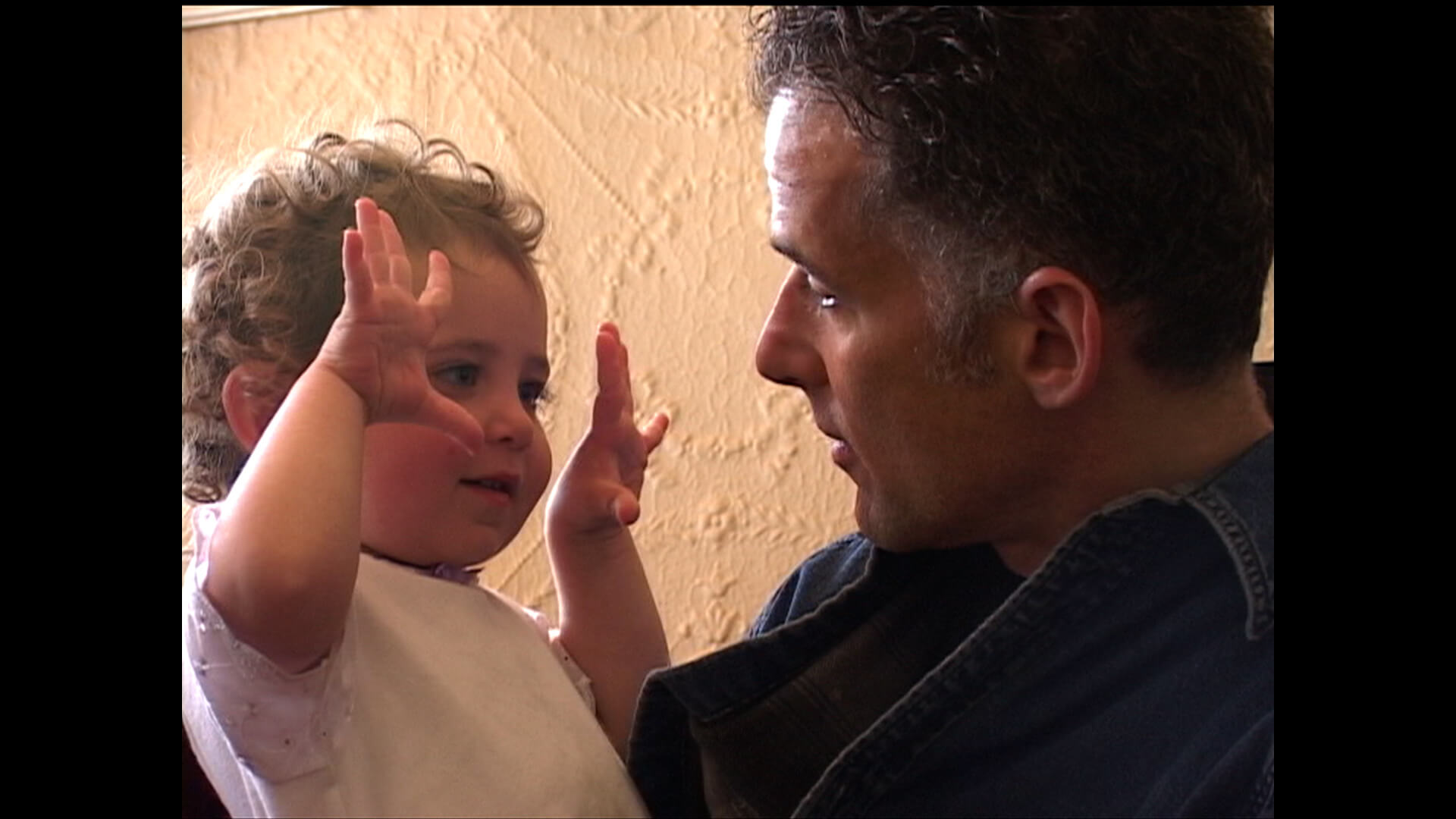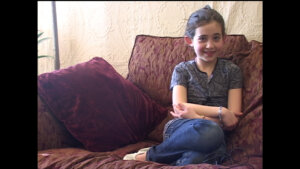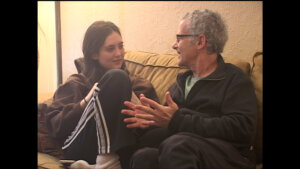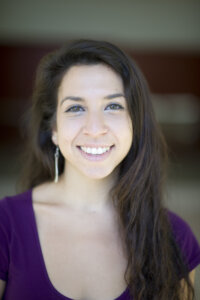‘Oh wow, this is gonna be good’ — How it feels to watch yourself grow up in 29 minutes flat
Ella Rosenblatt is the star of ‘How Do You Measure a Year,’ directed by her Oscar-nominated filmmaker dad

Ella Rosenblatt, age 2, with her filmmaker father, Jay Rosenblatt. Courtesy of HBO
One moment, Ella Rosenblatt is 2 years old, a rosy-cheeked toddler with a shock of curls who can’t quite sit still. “I big now!” she declares. The next thing you know, Ella is 18, a poised young woman sitting in the same spot, contemplating adulthood as she prepares to leave home.
Some birthday traditions involve cake and candles. Others involve a camera and candid conversations with dad. In How Do You Measure a Year? Ella’s father Jay Rosenblatt stitches together home video footage he captured during annual interviews that became a father-daughter ritual to make a short documentary film that is at once intensely personal and profoundly universal. In the span of 29 minutes, you see Ella grow up right before your eyes. And in this simple but poignant journey set to fast-forward, you might see yourself, or your child, and ponder the months that sometimes feel like they’re hurtling by in seconds.
“There’s some years where I say funny things and some years where I think I say things that might move people, but I don’t think it’s as much about me as an individual person,” but rather about how powerful it can be to watch anyone grow up and see how they change over time, Ella told me on a video call. She sat for a rare interview perched on a chair next to her dad, who’s tried to be protective of her privacy even as the film was nominated for an Oscar and became available to stream on HBO Max.

A San Francisco-based therapist turned filmmaker, Jay had already made a movie about Ella before she celebrated that second birthday, documenting the first 18 months of his daughter’s life and the beginnings of his new one as a parent in I Used to Be a Filmmaker. It was natural to keep shooting. He made three other films with Ella in those early years — including two comedic shorts involving ice cream and a Charlie Chaplin costume, as well as Beginning Filmmaking, a more complex project that followed his efforts to teach Ella how to make a film of her own when she was 4. Ella associates her childhood with being filmed, she said, which makes it hard to tease out in her memory the first sessions that ultimately became How Do You Measure a Year?
When he picked up the camera to start interviewing Ella on her second birthday, “I did have the hope that it could turn into a film. But of course, there were so many years to come and you don’t know what could happen,” said Jay, who has been the director of programming for the Jewish Film Institute (presenters of the SF Jewish Film Festival) since 2010, in addition to making his own work. “At the very least I thought we would just do this so she’d have an archive of her birthdays.”
He began asking her a recurring list of questions that evolved over time. What’s your favorite food? (At age 3, “a treat,” and when pressed, “lollipops.”) What are dreams? (At 4, she says they’re when “you sleep and think at the same time.”) What do you like most in life? (At 7, it was friends, family and Hannah Montana.) Ella’s mom (and Jay’s wife), Stephanie Rapp, makes a cameo appearance on her 10th birthday, and although Ella doesn’t have any siblings, she was always trying to get her beloved dogs in the frame (“Does my dog count as my family?” she asks one year).
Jay regularly asked Ella to consider: What do you want to do when you grow up? (Her answer evolved from “put on makeup and eat gum” at 3 to “be a mommy” at 4 to “be a singer” at 7 to become an “animal rights activist” at 11.) What were the highlights of this past year? (At 13, it was celebrating her bat mitzvah and becoming a vegan.) What are you afraid of? (At 6, she tells Jay, “You scare me,” but declines to say why. At 9, she’s afraid of “being different, not fitting in, and being made fun of.” At 15, it’s that “somebody really important to me is going to die.”)
And he never stopped asking her: How do you feel about our relationship? What is power? “For me, it was just a good way to check in, because day to day, you just don’t ask those kinds of questions,” Jay said of the former. And though he can’t remember exactly what prompted the latter, it had something to do with wanting his daughter to feel empowered in a society that doesn’t always raise girls to see themselves that way.
At first, she didn’t quite know what the word “power” was. By age 11, she says: “Power is being able to stand up for what you believe in. Power is being yourself.”

Every minute or two the screen flickers and cuts to the next birthday. Ella is a cute kid saying the darndest things. Ella is a sullen teenager who loves sleeping and isn’t happy, she says, but is working on it. Ella is a stressed-out high schooler who wants to move their sit-down along a little faster, but is nevertheless grateful they do this together every year.
“There’s something very calming about ritual. It can feel very reassuring to know what’s coming,” Ella told me. “Even birthdays can be kind of anxiety-producing. So to know every year at least one thing was going to be consistent, I think, was soothing.”
When she sat down for the session both she and her dad knew would be the last of its kind, Ella told me, “It was hard not to think of the end of that ritual as related to the fact that I was going to college in a few months and the end of a lot of my childhood and my life at home on that couch and with my parents.”
That year, when Ella was turning 18, Jay volunteered to leave the room and let her talk to the camera alone. What follows is a moment I won’t ruin by recounting it before you have a chance to watch yourself.
Jay didn’t watch it — or any of the other tapes — until the COVID-19 lockdowns. He’d just finished making another Oscar-nominated short documentary, When We Were Bullies, which probed an incident from his own childhood. “I felt a kind of creative emptiness and I thought, I should look at the birthday footage,” he said. He was relieved, first off, that it turned out. For years he’d been a one-man crew setting up old equipment he was always worried might let him down.
Then, watching the final tape, he was overcome. “I felt like Ella gave me a gift,” he said. “As a parent, it was very confirming and also just very satisfying. And as a filmmaker I thought, ‘Oh, wow, this is gonna be good.’”
So he got to editing, pulling out the best scenes and sometimes leaning on clips of Ella singing. Those moments of performance are themselves a window into her evolving tastes and talents as she sings Rent’s “Seasons of Love” — the song that gave the film its name — and later Beyoncé’s “Single Ladies (Put a Ring on It),” Christina Perri’s “A Thousand Years” and finally Cat Stevens’ “Wild World.”
“The power of the film is how short it is,” Jay said. “That’s how it really feels. Day to day it’s slow being a parent, but it goes by so fast. Everyone says that to you when you first have a kid. And this film kind of exemplifies that.”
To ensure Ella felt comfortable with what he was pulling together, he showed her rough cuts and asked for her consent to include the footage he’d chosen. “It was really easy and enjoyable to see the first few years,” Ella told me. The distance helped, and she was used to seeing her toddler self in her dad’s films. But it got harder as the Ella onscreen got older. It “felt closer to who I was and therefore maybe more subject to judgment from an audience that would then reflect on who I am now,” she said. “There was a part of me that was very worried and embarrassed. But I also realized that those moments are always going to be harder for me to see than anyone else. And they’re what helped the film feel authentic.”
At the same time, she separates herself from it. For one, the snippets of birthday footage reflect her mood and self on one day every year, hardly a complete representation of who she is. “It’s interesting to see what the film captures and what it misses,” Ella said. “There’s parts of me that I feel really shine through in the film, and then there’s other things, like aspects of my identity that I think of as pretty salient, that don’t.” And while the documentary is about her, it’s by her father. “It’s partly what I gave to him, but also what he made of it. And so in some ways, the film is just a reflection of how he sees me.”
Ella’s 18th, which marked the last of the official birthday interviews, closes the film. But they didn’t go completely cold turkey. The following year, they did a FaceTime version of the annual ritual that neither was quite ready to relinquish — Jay seeing Ella looking a little older and a little more confident in her dorm room at Pitzer College, where she ultimately majored in environmental analysis and minored in English. And although they haven’t done the same kind of sit-down since, COVID-19 meant Ella was unexpectedly back home when she turned 20, movie-related visits to LA brought her parents down to see her at school the next two years, and the Oscars fell right around her latest birthday.
“I think it hasn’t fully hit me, because in the years since 18, it’s kind of been replaced by something every year, something that connects us,” Ella said. Besides, she reminded me, “364 days of the year are outside of the movie, and we’re still engaging with each other.” The same has been true since they wrapped. At the end of the day, it’s not so much that the film or the ritual shaped their father-daughter dynamic, but that it revealed and reflected something that was already there — and still is.























